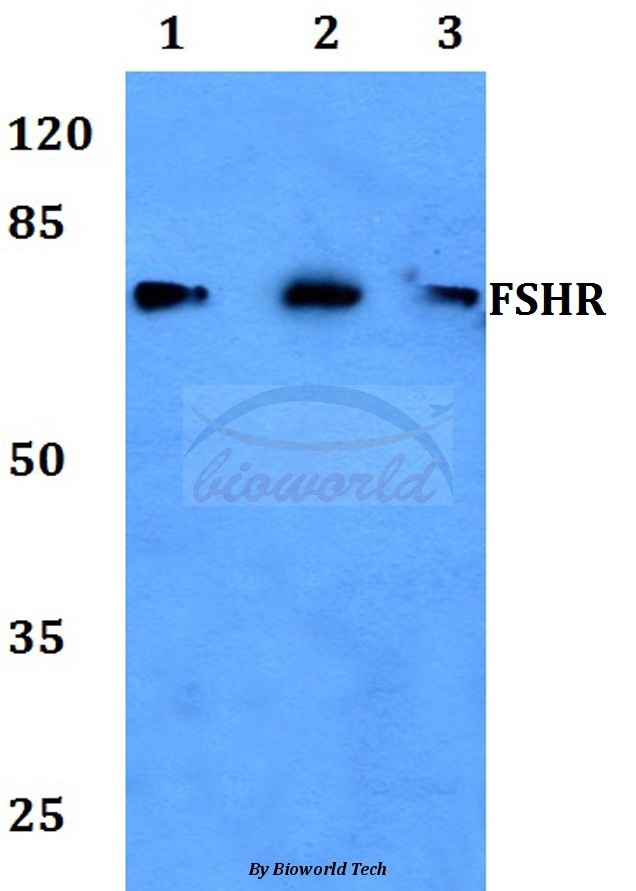Product Name :
FSHR (R247) polyclonal antibody Background :
Follicle-stimulating hormone receptor (FSHR) is a 695 amino acid G-protein coupled receptor. FSH binds to the receptor in a hand-clasp fashion via its α and β subunits. While the α subunit of FSH is involved in the binding of FSH to the receptor, the β subunit stabilizes this interaction. Linkage studies suggest that a missense mutation in the FSHR gene can cause reduced FSH binding affinity and lead to a condition known as hypergonadotropic ovarian dysgenesis (ODG). In males however, this mutation does not appear to have a detrimental affect on fertility. It is believed that a mutation in the FSHR gene is also associated with ovarian hyperstimulation syndrome; a condition characterized by the presence of multiple serous and hemorrhagic follicular cysts lined by luteinized cells. Product :
Rabbit IgG, 1mg/ml in PBS with 0.02% sodium azide, 50% glycerol, pH7.2 Storage&Stability :
Store at 4°C short term. Aliquot and store at -20°C long term. Avoid freeze-thaw cycles. Specificity :
FSHR (R247) polyclonal antibody detects endogenous levels of FSHR protein. Immunogen :
Synthetic peptide, corresponding to amino acids 215-265 of Human FSHR. Conjugate :
Unconjugated Modification :
Unmodification
FSHR (R247) polyclonal antibody Background :
Follicle-stimulating hormone receptor (FSHR) is a 695 amino acid G-protein coupled receptor. FSH binds to the receptor in a hand-clasp fashion via its α and β subunits. While the α subunit of FSH is involved in the binding of FSH to the receptor, the β subunit stabilizes this interaction. Linkage studies suggest that a missense mutation in the FSHR gene can cause reduced FSH binding affinity and lead to a condition known as hypergonadotropic ovarian dysgenesis (ODG). In males however, this mutation does not appear to have a detrimental affect on fertility. It is believed that a mutation in the FSHR gene is also associated with ovarian hyperstimulation syndrome; a condition characterized by the presence of multiple serous and hemorrhagic follicular cysts lined by luteinized cells. Product :
Rabbit IgG, 1mg/ml in PBS with 0.02% sodium azide, 50% glycerol, pH7.2 Storage&Stability :
Store at 4°C short term. Aliquot and store at -20°C long term. Avoid freeze-thaw cycles. Specificity :
FSHR (R247) polyclonal antibody detects endogenous levels of FSHR protein. Immunogen :
Synthetic peptide, corresponding to amino acids 215-265 of Human FSHR. Conjugate :
Unconjugated Modification :
Unmodification
Smad3 regulates the diverse functions of rat granulosa cells relating to the FSHR/PKA signaling pathway
PMCID: Pubmed No.:23690627
Effects of Smad3 on the proliferation and steroidogenesis in human ovarian luteinized granulosa cells
PMCID: Pubmed No.:24979474
Effects of gonadotropin on Fas/FasL expression and proliferation in rat ovary
PMCID: Pubmed No.:25294749
Hyaluronic acid prevents immunosuppressive drug-induced ovarian damage via up-regulating PGRMC1 expression
PMCID: Pubmed No.:25558795
Paracrine Regulation of Steroidogenesis in Theca Cells by Granulosa Cells Derived from Mouse Preantral Follicles
PMCID: Pubmed No.:26357661
Effects of gonadotropin on Fas/FasL expression and proliferation in rat ovary
PMCID: Pubmed No.:25294749
Hyaluronic acid prevents immunosuppressive drug-induced ovarian damage via up-regulating PGRMC1 expression
PMCID: Pubmed No.:25558795
Paracrine Regulation of Steroidogenesis in Theca Cells by Granulosa Cells Derived from Mouse Preantral Follicles
PMCID: Pubmed No.:26357661
Brain‐derived neurotrophic factor promotes proliferation and progesterone synthesis in bovine granulosa cells
PMCID: Pubmed No.:30456817
The Mechanisms of BDNF Promoting the Proliferation of Porcine Follicular Granulosa Cells: Role of miR-127 and Involvement of the MAPK-ERK1/2 Pathway
PMCID: Pubmed No.:36978655
Bioworld Biotech only provide peptides for our antibodies and do not provide additional peptide customization services.
Price/Size :
USD 368/1mg/vial
Tips:
For phospho antibody, we provide phospho peptide(0.5mg) and non-phospho peptide(0.5mg).Describe :
Blocking peptides are peptides that bind specifically to the target antibody and block antibody binding. These peptide usually contains the epitope recognized by the antibody. Antibodies bound to the blocking peptide no longer bind to the epitope on the target protein. This mechanism is useful when non-specific binding is an issue, for example, in Western blotting (WB) and Immunohistochemistry (IHC). By comparing the staining from the blocked antibody versus the antibody alone, one can see which staining is specific; Specific binding will be absent from the western blot or IHC performed with the neutralized antibody.Formula:
Synthetic peptide was lyophilized with 100% acetonitrile and is supplied as a powder. Reconstitute with 0.1 ml DI water for a final concentration of 10 mg/ml.The purity is >90%,tested by HPLC and MS.
Storage:
The freeze-dried powder is more stable. For short time at 2-8°C. For long term storage store at -20°C.
Note :
This product is for research use only (RUO only). Not for use in diagnostic or therapeutic procedures.
 FSHR (R247) polyclonal antibody
FSHR (R247) polyclonal antibody 
 Datasheet
Datasheet COA
COA MSDS
MSDS SHIP
SHIP